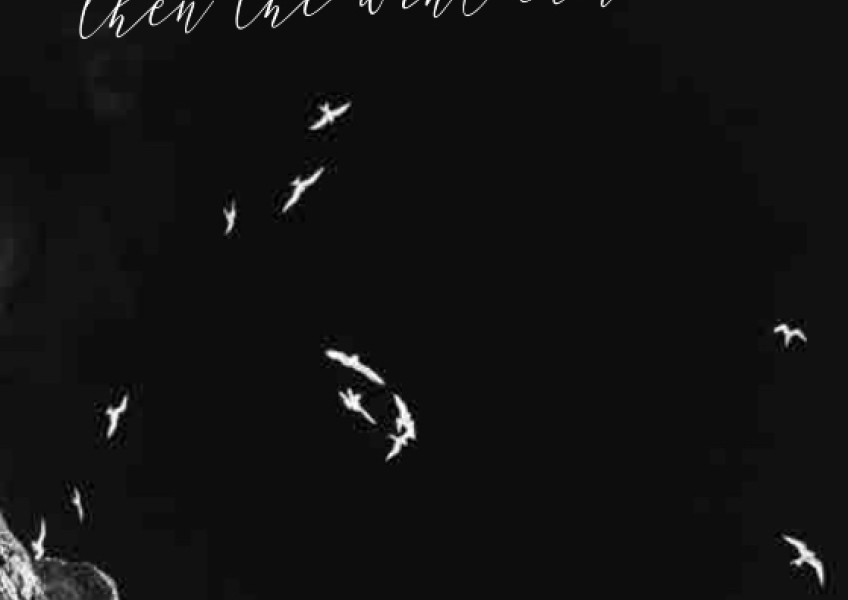Book release: then the wind came

Dunedin has a burgeoning literary community, they’re our closest city and university so what happens there is worth celebrating. Iona Winter is a writer with a special connection to both Māori culture and the land. Her first book, ’then the wind came’ is being launched next Friday at the Dunedin Atheneum. Winter is humble, she’s achieved a lot and worked hard to get her manuscript published. It comes back to the special magic of the writing process. She writes surrounded by taonga, grounded in her environment.

Iona Winter, at home by the water.
‘I use a room that looks out onto native trees where I can hear the birds waiata to me. Dunedin harbour is in the distance (if I squint and stand on tiptoes). I use a standing desk - basically a cardboard box on top of my grandfather’s desk with a monitor and keyboard wired up to the laptop underneath the desk. Beneath my feet is a yoga mat, and alongside the desk are stacks of writing-related things on the floor (in semi-orderly piles). There’s also a foldout camp bed with my Gran’s crocheted blanket on it. I have a treasured kai moana kete of Hone’s on the wall, gifted to me by one of my beautiful customers from work.’
Like so many writers, Winter has been doodling with words since she was a young whippersnapper. She started with pre-teen poetry, progressed to cathartic teen-angst poetry and even sent a manuscript out. As with so many of us, time became scarce and she entered an almost ten-year hiatus while studying and focussing on academic writing.
Perhaps this genesis of her writing craft has influenced her form, she is equally at home with both poetry and prose. ‘then the wind came’ is a unique hybrid collection.
'The book is in four sections, representing the elements Whenua/Earth, Āngi/Air, Ahi/Fire, and Wai/Water. Each section consists of poetry, a short story, and several short form fiction/prose poetry pieces.’
With such a hybrid style that traverses form and length, Winter’s process is a mix of organised and organic.
‘I have copious notes on my phone and in several journals, usually in the form of short sentences, observations, dialogue or thoughts. About once a month I’ll go through them, and intuitively go with the one(s) I like best.’
She says she’s always thinking about writing, even on the go, or when she’s taking a break, ideas are in the back seat. She draws inspiration from the great New Zealand writers, Hone Tuwhare and Janet Frame. It was an early encounter with Tuwahre’s writing that drew her to Māori writing and culture.
‘I remember reading No Ordinary Sun for a drama exam, and being marked down for choosing a NZ poet over an English one. The inequity stuck with me - those who know me will say I’ve always been an advocate for the marginalised in our communities.’
Winter is well qualified, she’s completed a course with the NZ Writers College, a Masters in Creative Writing at AUT and has been the recipient of an NZ Society of Authors Mentorship. Her form has returned time and again to short form fiction and poetry, she likes the freedom it offers. ‘It allows for writing along a continuum, rather than to a prescribed formula.’ She says.
Winter’s book is a labour of love, it holds her dearest thoughts and years of crafted writing. It also tells her story, her history. She’s found an interesting source of inspiration for how to convey such big messages.
‘Recently, I discovered Irish writers Eilis Ni Dhuibhne and Claire Keegan, and then at LitCrawl in Wellington I met the stunning poet Doireann Ni Ghriofa. I see many parallels between Māori and Irish writing, in terms of how the past, present and spiritual dimensions are woven throughout — it also connects to my own whakapapa.’
Winter is hesitant to define her style, her words mean different things to different people. One thing she does agree with is that she doesn’t shy away from the tough issues, she crosses boundaries and engages with topics that people can relate to. Sometimes confronting, she returns time and again to the challenges of mixed race and oppression.
What sums her up best as an author though, is what she seeks to achieve.
‘Being real, both as a human being and a writer, is very important to me.’
Book Launch: Friday December 14th, 6pm at the Dunedin Athenaeum Library.
Where to find it: ‘then the wind came’ is available for pre-orders via [email protected] and will be in all good bookstores nationwide.
What the critics say:
A startling collection of stories and poems, this book’s bricolage of narratives speaks of life as it truly is: complex, traumatic and ultimately celebratory. It confirms Iona Winter as a profound writer, with an original new voice. - Siobhan Harvey
Iona Winter pays attention to the world around her, natural and unnatural, serene and violent. By turns dark, visceral and potent, here is a new voice speaking to us of things unspoken. - Tina Makereti
A wonderful new realism, the writing is strong and clear, infused with feeling and shot through with a palpable sense of an expanded natural world. ‘then the wind came’ is a collection that will bring you back to life. - Sue Wootton
Sensuous, salt-tinged, stained with blood, ‘then the wind came’ is a reckoning. Winter’s precise language moves the collection towards renewal, and emerges as an act of aroha. - Thom Conroy
























